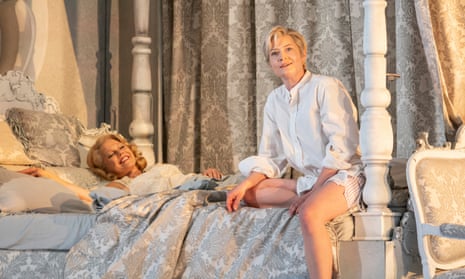“Time is a strange thing,” the Marschallin tells us in Der Rosenkavalier. Richard Strauss’s bittersweet comedy of manners examines the way time irrevocably changes lives, and the score charts its passing by gliding anachronistically between periods, evoking 18th-century Vienna (where the opera is set), the 19th-century city of the Viennese waltz, and the dissonant, modernist world of the period (1909-10) in which it was written.
Bruno Ravella’s new Garsington Opera production adds another period into the mix by relocating it to the 1950s, where Miah Persson’s glamorous Marschallin dons a Dior-ish new look suit in Act one, then arrives in a stunning couture ball gown in Act three to resolve the escalating emotional tangle between Hanna Hipp’s gauche Octavian, Madison Leonard’s wilful, spirited Sophie and Derrick Ballard’s Ochs.
Marvellously designed by Gary McCann, it’s a superbly detailed, if occasionally flawed piece of theatre, notably strong on subtle gradations of feeling and the complex relationship between love and sex, so both the Marschallin’s deepening awareness of the encroachment of age and the transience of desire, and the growing attraction between Sophie and Octavian are beautifully done. The updating, however, sometimes blurs Strauss’s distinctions between aristocratic decline, an emerging middle class, and an urban proletariat on the make: Richard Burkhard’s nouveau riche Faninal reeks of monied ostentation, though Annina (Kitty Whately) and Valzacchi (Colin Judson) look just a bit too respectable.

Ravella’s symbolism can also, on occasion, be a bit heavy handed. In place of the Marschallin’s page, a rococo cupid wryly observes the unfolding drama. And roses themselves have become ubiquitous: we see them in the plaster curlicues that adorn the ceiling of Marschallin’s bedroom; the Italian Tenor (Oliver Johnston) rather incongruously carries bunches of them in a knapsack; and a flower seller repeatedly proffers them during the Act three tryst between Ochs and the disguised Octavian.
Persson is a most wonderful Marschallin, sounding and looking lovely, delivering both text and line with understated refinement, so that every word and emotional shift really register. Leonard, in another excellent performance, makes an exquisite Sophie, though Hipp took a while to settle on opening night – there were some uncharacteristic moments of suspect intonation near the start. Ballard’s Ochs, less empathetic than many, is a boorish coward, who screams murder before Octavian has even touched him, though his tone is warm and the role lies comfortably for him. In order to enable the Philharmonia to observe social distancing in the pit, a reduced orchestration by Eberhard Kloke is used. You miss some of the sensuality of Strauss’s original, but it’s handsomely conducted by Jordan de Souza and quite superbly played.

Comments (…)
Sign in or create your Guardian account to join the discussion